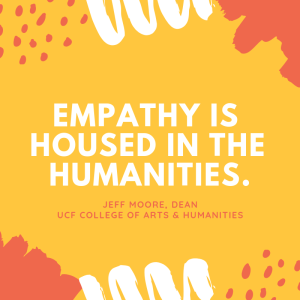
Dean Jeff Moore, director Rudy McDaniel of the School of Visual Arts and Design and director Michael Wainstein of the School of Performing Arts joined co-hosts Joshua Vickery, executive director of Central Florida Community Arts, and Mary Thompson Hunt on “From the HeART”, a Magic 107.7 radio show that features talented and passionate leaders and artists who shape the Central Florida arts community. Some topics of discussion include the importance of humanities and the role that arts and creativity play in innovation, the comparative trends of traditional arts and emerging media, and how the internet age has transformed the way communities consume the arts.
Below are highlights from the show. Listen to the full episode here.
1. On why they’re called “the humanities”
Jeff Moore: It goes back to the very beginning of education when people grouped the seven liberal arts together. They evolved over time because when this was occurring, there wasn’t necessarily a division of science. Science had to further evolve as a concept and then, of course, a discipline. So as universities have grown and the subject matter they have taken on has extended, the disciplines of the original liberal arts areas became the humanities.
2. Why study the humanities
JM: By making sure we have a thorough knowledge of the past, we can try and prevent repeating the same mistakes. But the humanities also teach us how to interrelate with each other, to be sensitive to each other. Empathy is housed in the humanities.
3. Emerging media and traditional art forms — two sides of the same coin
Rudy McDaniel: We’ve seen a lot of growth in the digital arts, but the fine arts are pretty healthy too. I think a lot of students are drawn to the diversity of media they can create art in. Mixed media is something that’s become very popular with students. For example, students sometimes incorporate photography into a 3D-printed model, pulling different types of art together to create something new.
4. An example of the arts’ impact
JM: One of our doctoral students, Albert Manero, came up with the idea for Limbitless, a program that uses low-cost 3D-printers to build prosthetics for children with missing limbs. The College of Arts and Humanities has helped market the program. We also brought in video game professors from SVAD to design a game that the children can play using muscle pads, so by the time the prosthetic was created and put on them, they already have the muscle control necessary to manipulate the fingers. It’s a fantastic example of a bunch of disciplines converging on a problem and solving it.
5. UCF, America’s partnership university
JM: We believe strongly that UCF isn’t just in the community, it’s of the community. Our partnerships give us the chance to walk that talk. We’ve had longstanding partnerships with lots of different groups across spectrums and disciplines. In the arts, we have partnered with the Orlando Shakespeare Theater, the Orlando Repertory Theatre, the Orlando Philharmonic Orchestra, and the Atlantic Center for the Arts. Our partnerships are a chance for our students to experience high-impact activities in their degree programs.
Michael Wainstein: Last year our music professors did workshops, master classes and clinics in over 150 schools in the Florida region. Chung Park, our orchestra director, goes to 10 schools a week. It’s a wonderful thing that we do — getting the community involved — and we’re very closely related with a lot of these high school and junior high school music programs because several are run by our grads.
JM: Part of our partnership rule is asking how students will be affected by it. What is the impact? We believe in positively impacting lives, and partnerships are a way for UCF to extend our grip, our fingers, to be able to touch as many lives as possible.
Hear the full conversation on Central Florida Community Arts: Episode 87